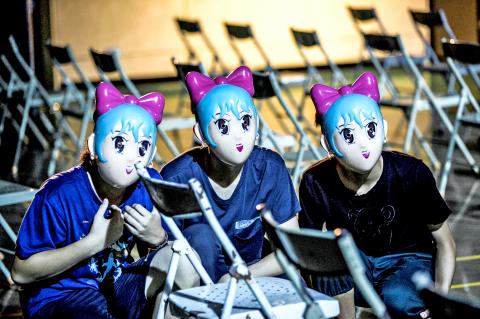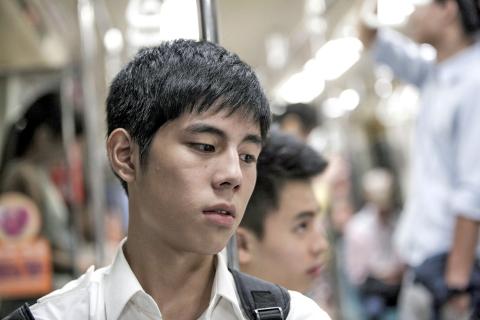At a time when the sound of teen film spells overuse and cliche, Yee Chih-yen’s (易智言) Meeting Dr. Sun (行動代號:孫中山) comes as a refreshing surprise. The comedy, about a group of teenage boys and their whimsical plans to address their poverty, casts a lyrical and vigorous look into Taiwan’s social inequality through the eyes of the young. Alternating between farcical humor and emotional acuteness, Yee’s latest work can be seen as an ode to the waves of youthful civil disobedience against the system, which climaxed in the Sunflower movement.
Lefty (Zhan Huai-yun, 詹懷雲), one of the central characters, lives with his grandmother who earns NT$15 for every plastic flower she makes at home. Lefty believes he is the poorest kid in his high school and is unable to pay the “class fee” extorted by a classmate. While hiding from the bully in the school storeroom one day, he discovers a bronze statue of Sun Yat-sen (孫逸仙). For Lefty, however, the statue doesn’t signify the ROC’s founding father, but a financial windfall in the form of scrap metal worth a big chunk of money. The slab, he thinks, will be his ticket out of poverty.
And so he immediately devises a plan to steal and sell the valuable statue, calling on his equally impecunious friends to help. However, he soon finds out that Sky (Wei Han-ting, 魏漢鼎), a boy who goes to the same school, is also plotting to turn the discard into quick cash.

Photo courtesy of Activator Marketing Company
The two hold a match to decide who is poorer and thus needs the money more. Using food tastings at supermarkets as the source of his daily diet and sleeping on the streets to avoid his drunken father’s violent outburst, Sky wins. Readily accepting his defeat, Lefty offers to collaborate with Sky, whom he thinks a new comrade.
Watching the enthusiastic Lefty sharing the details of his plan, Sky has something else in mind.
When the big night comes, two groups of masked thieves appear on campus. The battle over the statute of Sun Yat-sen ends up with Sky and Lefty lying on the empty street in Ximending (西門町), exhausted. As the wailing of police sirens comes near, they recognize the problem of poverty and fight it together.

Photo courtesy of Activator Marketing Company
In Meeting Dr. Sun, director Yee does a superb job in translating the anger against the unjust, corrupt system into an expressive comedy. The most noticeable example is the use of pantomime in the sequence in which the young burglars try to carry out their operation. What’s more striking is how the story finds its most resonant strength in juxtaposing the light with the unbearable. In the sequence in which the group of teenagers bicker over who comes from the most disadvantaged family, what starts out as fun raillery ends up with an indignant cry from Sky: “the children of our children are doomed to be poor.”
More fable than drama, the film approaches the complex social problems with lucid simplicity.
Equally essential to the narrative is the soundtrack composed by Chris Hou (侯志堅). Hou’s music is playful, delicate and vivacious at the same time, almost like a waltz of the humiliated and the insulted.
Towards the end of the film, we follow the bronze statue as it’s transported on a truck through the streets of Taipei. Suddenly, the camera pans up to show the gang of teenage boys, who raise their hands in solidarity, the Taipei World Trade Center towering in the background. It is a poignant moment, filled with poetry, and like the film itself, resonates long after the closing credits.

On April 26, The Lancet published a letter from two doctors at Taichung-based China Medical University Hospital (CMUH) warning that “Taiwan’s Health Care System is on the Brink of Collapse.” The authors said that “Years of policy inaction and mismanagement of resources have led to the National Health Insurance system operating under unsustainable conditions.” The pushback was immediate. Errors in the paper were quickly identified and publicized, to discredit the authors (the hospital apologized). CNA reported that CMUH said the letter described Taiwan in 2021 as having 62 nurses per 10,000 people, when the correct number was 78 nurses per 10,000

As we live longer, our risk of cognitive impairment is increasing. How can we delay the onset of symptoms? Do we have to give up every indulgence or can small changes make a difference? We asked neurologists for tips on how to keep our brains healthy for life. TAKE CARE OF YOUR HEALTH “All of the sensible things that apply to bodily health apply to brain health,” says Suzanne O’Sullivan, a consultant in neurology at the National Hospital for Neurology and Neurosurgery in London, and the author of The Age of Diagnosis. “When you’re 20, you can get away with absolute

May 5 to May 11 What started out as friction between Taiwanese students at Taichung First High School and a Japanese head cook escalated dramatically over the first two weeks of May 1927. It began on April 30 when the cook’s wife knew that lotus starch used in that night’s dinner had rat feces in it, but failed to inform staff until the meal was already prepared. The students believed that her silence was intentional, and filed a complaint. The school’s Japanese administrators sided with the cook’s family, dismissing the students as troublemakers and clamping down on their freedoms — with

As Donald Trump’s executive order in March led to the shuttering of Voice of America (VOA) — the global broadcaster whose roots date back to the fight against Nazi propaganda — he quickly attracted support from figures not used to aligning themselves with any US administration. Trump had ordered the US Agency for Global Media, the federal agency that funds VOA and other groups promoting independent journalism overseas, to be “eliminated to the maximum extent consistent with applicable law.” The decision suddenly halted programming in 49 languages to more than 425 million people. In Moscow, Margarita Simonyan, the hardline editor-in-chief of the